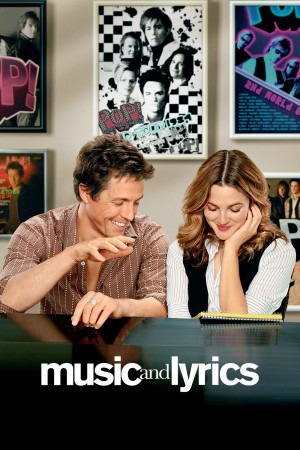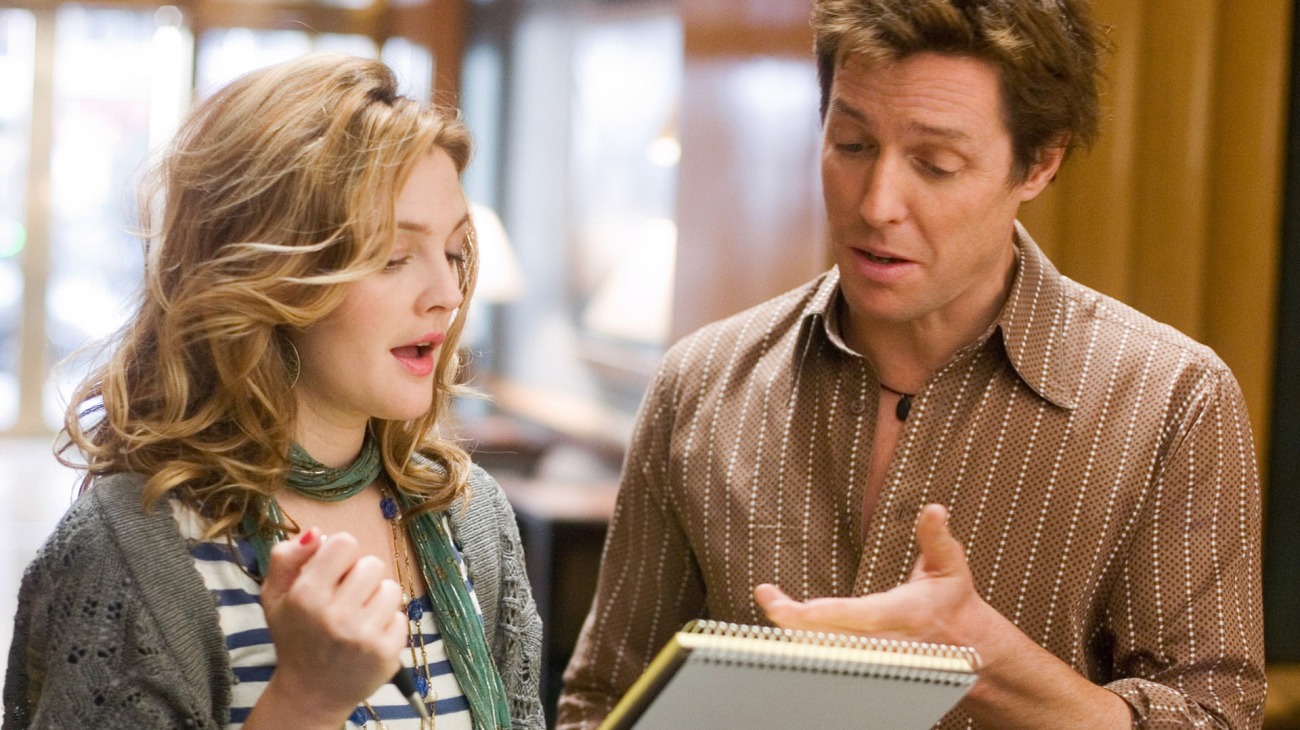
The romantic comedy is dead; but the corpse is twitching a bit
I'm sure part of it is just that I'm coming off of a run of some excessively bad films (AKA: the first 8 months of any given year), but I actually didn't hate Music and Lyrics. I did not love it, to be certain; I am not going to go around proclaiming that everybody or anybody must see it, nor that it stuck in my head for longer than the ending credits. But for what it is, it's charming enough.
Observe the poster to the right. If you click on it, you will see a larger version. This poster communicates everything about the film: it is romantic (they are touching shoulders!) and a comedy (they are grinning!). It stars Hugh Grant (hence, a charming, shallow Brit who comes around!). It stars Drew Barrymore (hence, a bubbly, neurotic young woman who nervously finds love!). It is about song-writing ("music and lyrics"). Hugh Grant apparently does something with his hand involving levitating objects with the Force (poster interpretation is not an exact art). I could quite literally end this review right now, because your response to that poster dictates your precise response to the film as a whole.
But that's lazy, and I'm a talker.
The undeniable comic peak of the film comes, unfortunately, in the very first scene: a pitch-perfect, hilariously awful music video set to a hilariously awful bit of '80s-style synthpop called "Pop Goes My Heart." In all honesty, it's a rather economical and subtle way to set up the basic premise of the film: Hugh Grant was a pop star 20 years ago, and now he's not. And then the plot actually begins, and both economy and subtlety are gently set by the wayside for the remaining 1.5 hours of rom-com watercolors.
Grant and Barrymore are Alex Fletcher and Sophie Fisher, a former pop star and a wannabe writer with anxiety issues, respectively. If you care about the plot in a film like this, I think that you are deranged. Plot is not the point. That said, the plot involves Alex being given once last chance at recapturing his success when the flavor-of-the-month megastar Cora Corman invites him to write her a new single, and his drafting of Sophie to be his lyricist (she has a natural ability to rhyme sentences and write strangely arrhythmic phrases that are, in the world of the film, praised as Great Poetry). You know the rest. Seriously, you know the rest.
One does not go to a film like Music and Lyrics looking for wicked satire, and one does not find it, but it's only fair to point out that after the opening scene, the funniest parts of the film are those centring on Cora. Played by debuting actress Haley Bennett with the assurance and depth of a grizzled veteran, Cora is the embodiment of all that sucks the life out of modern music: a needlessly sexual stage persona blended with faux hip-hop posturing blended with the most superficial understanding of Eastern religion. The second-best scene of the movie (also, intriguingly, a music video) shows Cora slinking around barely-dressed "Buddhist" monks venerating her as she orgasms out a totally forgettable song. It's every bit as finely-tuned and accurate as the '80s send-up that opens the proceedings, and gives the movie the closest thing it will ever have to a bite.
That's not really the point of the film, obviously. It's easy enough to dismiss Music and Lyrics as a wafer, but it's a fine product. That's all romantic comedies are, anyway: products. Commodities. Which is why the poster and the experience of viewing the film are esssentially identical. It's like getting a McDonald's Quarter Pounder and a Diet Coke. The point isn't to be surprised with delight, it's to have something that is precisely what you anticipate it to be. Surprise, even good surprise, is a liability.
And so, Hugh Grant© and Drew Barrymore© are teamed up. The results are fairly predictable, but just a little bit disappointing. The tragic fact of the matter is that Grant© and Barrymore© aren't totally compatible, like having that aforementioned Quarter Pounder with a Taco Bell burrito instead of fries. Grant hasn't really had chemistry with a leading lady in ages, and Barrymore is too far from the Hugh Grant type to overcome that. Luckily, I guess, both actors have enough chemistry with the camera that they create the illusion of having chemistry together, and there are a couple scenes early on, i.e. before they fall in love and can't fake it anymore, where they banter as well as anyone does nowadays, i.e. not very.
It's probably fair to blame writer-director Marc Lawrence, whose workmanlike screenplay is poorly served by his anemic direction. Sometimes, you know how you can just tell that a director considered his job to consist solely of telling the DP where to put the camera, the actors where to stand, and then it's off to the craft table? That kind of direction. The stars have enough energy to overcome that, but the rest of the cast really doesn't: Brad Garret, as Alex's manager, just kind of does a Brad Garrett, and everybody else just mugs.
But nobody expected The Lady Eve, and frankly, if The Lady Eve were produced today, I think the studios wouldn't have the first idea what to do with it. This it what it is: solid craftsmanship for a perfectly ordinary genre film. It's as synthetic and mass-produced as the over-iced soda you'll be drinking with it, and that's the way it's supposed to be.
5/10
Observe the poster to the right. If you click on it, you will see a larger version. This poster communicates everything about the film: it is romantic (they are touching shoulders!) and a comedy (they are grinning!). It stars Hugh Grant (hence, a charming, shallow Brit who comes around!). It stars Drew Barrymore (hence, a bubbly, neurotic young woman who nervously finds love!). It is about song-writing ("music and lyrics"). Hugh Grant apparently does something with his hand involving levitating objects with the Force (poster interpretation is not an exact art). I could quite literally end this review right now, because your response to that poster dictates your precise response to the film as a whole.
But that's lazy, and I'm a talker.
The undeniable comic peak of the film comes, unfortunately, in the very first scene: a pitch-perfect, hilariously awful music video set to a hilariously awful bit of '80s-style synthpop called "Pop Goes My Heart." In all honesty, it's a rather economical and subtle way to set up the basic premise of the film: Hugh Grant was a pop star 20 years ago, and now he's not. And then the plot actually begins, and both economy and subtlety are gently set by the wayside for the remaining 1.5 hours of rom-com watercolors.
Grant and Barrymore are Alex Fletcher and Sophie Fisher, a former pop star and a wannabe writer with anxiety issues, respectively. If you care about the plot in a film like this, I think that you are deranged. Plot is not the point. That said, the plot involves Alex being given once last chance at recapturing his success when the flavor-of-the-month megastar Cora Corman invites him to write her a new single, and his drafting of Sophie to be his lyricist (she has a natural ability to rhyme sentences and write strangely arrhythmic phrases that are, in the world of the film, praised as Great Poetry). You know the rest. Seriously, you know the rest.
One does not go to a film like Music and Lyrics looking for wicked satire, and one does not find it, but it's only fair to point out that after the opening scene, the funniest parts of the film are those centring on Cora. Played by debuting actress Haley Bennett with the assurance and depth of a grizzled veteran, Cora is the embodiment of all that sucks the life out of modern music: a needlessly sexual stage persona blended with faux hip-hop posturing blended with the most superficial understanding of Eastern religion. The second-best scene of the movie (also, intriguingly, a music video) shows Cora slinking around barely-dressed "Buddhist" monks venerating her as she orgasms out a totally forgettable song. It's every bit as finely-tuned and accurate as the '80s send-up that opens the proceedings, and gives the movie the closest thing it will ever have to a bite.
That's not really the point of the film, obviously. It's easy enough to dismiss Music and Lyrics as a wafer, but it's a fine product. That's all romantic comedies are, anyway: products. Commodities. Which is why the poster and the experience of viewing the film are esssentially identical. It's like getting a McDonald's Quarter Pounder and a Diet Coke. The point isn't to be surprised with delight, it's to have something that is precisely what you anticipate it to be. Surprise, even good surprise, is a liability.
And so, Hugh Grant© and Drew Barrymore© are teamed up. The results are fairly predictable, but just a little bit disappointing. The tragic fact of the matter is that Grant© and Barrymore© aren't totally compatible, like having that aforementioned Quarter Pounder with a Taco Bell burrito instead of fries. Grant hasn't really had chemistry with a leading lady in ages, and Barrymore is too far from the Hugh Grant type to overcome that. Luckily, I guess, both actors have enough chemistry with the camera that they create the illusion of having chemistry together, and there are a couple scenes early on, i.e. before they fall in love and can't fake it anymore, where they banter as well as anyone does nowadays, i.e. not very.
It's probably fair to blame writer-director Marc Lawrence, whose workmanlike screenplay is poorly served by his anemic direction. Sometimes, you know how you can just tell that a director considered his job to consist solely of telling the DP where to put the camera, the actors where to stand, and then it's off to the craft table? That kind of direction. The stars have enough energy to overcome that, but the rest of the cast really doesn't: Brad Garret, as Alex's manager, just kind of does a Brad Garrett, and everybody else just mugs.
But nobody expected The Lady Eve, and frankly, if The Lady Eve were produced today, I think the studios wouldn't have the first idea what to do with it. This it what it is: solid craftsmanship for a perfectly ordinary genre film. It's as synthetic and mass-produced as the over-iced soda you'll be drinking with it, and that's the way it's supposed to be.
5/10
Categories: joyless mediocrity, love stories, romcoms






